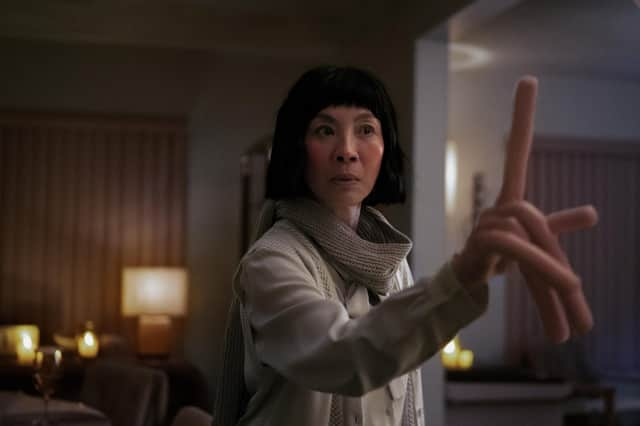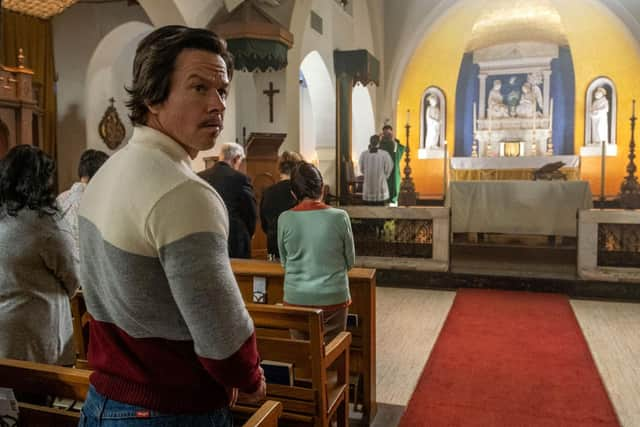Film reviews: Everything Everywhere All At Once | Doctor Strange | Vortex | Father Stu


Everything Everywhere All At Once (15) ****
Doctor Strange in the Multiverse of Madness (12A) ****
Vortex (15) ****
Father Stu (15) *
A family drama rendered as a wild, interdimensional martial arts fantasy, Everything Everywhere All At Once takes the suddenly in vogue concept of the multiverse and uses it to drag Crouching Tiger, Hidden Dragon star Michelle Yeoh through infinite versions of her character’s life as she tries to figure out how to fix her dysfunctional relationships with her husband, her father and, especially, her Gen Z daughter. Yeoh plays Evelyn Wang, a first generation Chinese American immigrant living – as one character puts it – the worst version of her life: the laundry business she runs is being audited; her meek but kind husband (former child star Ke Huy Quan – Short Round from Indiana Jones and the Temple of Doom) is trying to build up the courage to divorce her; her gay daughter (Stephanie Hsu) is frustrated that she won’t accept her for who she is, and the disapproving father (James Hong) she defied as a young woman has just arrived from China for a visit.
Setting all this up in a wonderfully condensed opening salvo that clues us into the imminent fracturing of its middle-aged heroine’s regret-filled existence, the film uses a meeting between Evelyn and her stern tax officer (a sly turn from Jamie Lee Curtis) as the mundane catalyst for the arrival of an ally from another dimension convinced she’s the saviour of every branching universe in existence. What this means for the movie is that Evelyn gets to visit multiple alternate versions of her life to acquire the requisite skills to stop the forces of chaos engulfing everything – a conceit that lets directing duo Daniel Kwan and Daniel Scheinert (collectively known as Daniels) go nuts by having worlds collide in which characters become glamorous movie stars, hotdog-fingered lovers, roughly sketched cartoons, piñatas and, at one point, a pair of telepathic rocks.
Advertisement
Hide AdAlthough infinitely more engaging than Daniels’ intensely irritating debut, Swiss Army Man, the quirk factor remains dialled up to 11 throughout. Nevertheless, it’s fun watching them pay zany homage to everything from Wong Kar-Wai’s In the Mood for Love and Ratatouille to 2001: A Space Odyssey, The Matrix and various Bill & Ted movies. Their mash-everything-up-in-a-cartoonish-frenzy filmmaking style is exhilarating – and oddly apropos for a social media age in which it’s all too easy to be overwhelmed by a digital world that puts devastating global events, meaningless celebrity news and our own banal day-to-day musings on an equal footing.


Meanwhile, in another multiverse, Marvel sorcerer Doctor Strange pulls off a trick better than zapping Tobey Maguire’s Peter Parker into Spider-Man: No Way Home by pulling Maguire’s Spider-Man director Sam Raimi back into the comic book movie fray, 20 years on from helping show what a modern superhero movie could be. It’s certainly a great choice on Marvel’s part. Doctor Strange in the Multiverse of Madness largely lives up to the promise of its title thanks to the wildly inventive, entertainingly chaotic visual style that Raimi honed on his Evil Dead slapstick horror trilogy. Indeed, those films provide an amusing reference point for what is, in effect, Marvel’s first horror film.
Doctor Strange’s cosmic shenanigans notwithstanding (he’s played once again by Benedict Cumberbatch, deploying his full arsenal of abracadabra hand gestures), the film gets entertainingly gruesome by pitting him against Elizabeth Olsen’s Wanda as she embraces her Scarlett Witch alter-ego and wreaks havoc on many different worlds in her bid to travel through the multiverse to find an alternate reality in which she can be a mother to the two boys she dreams about every night. That’s about as much as can be divulged without this review getting as crazily convoluted as the film, but the frame is bursting with so much energy it’s a joy to get dragged along. And who else but Raimi would think to give have a big superhero monologue delivered by a zombie with half a face?
With Vortex, Irreversible director Gasper Noé returns with his most humane film to date: a daring, formally rigorous dementia drama following an elderly couple as their lives are torn apart by the disease. Noé symbolises this early by literally drawing a line down the centre of the frame to separate Liu (played by Italian horror maestro Dario Argento) and the Alzheimer’s afflicted Elle (Françoise Lebrun) as they lie in their beds asleep. The rest of the film takes place in split screen as we follow their interactions over several fraught weeks as they rattle around their boho Parisian apartment. Noé uses the space, which is crammed with the detritus of the lives they’ve built together (books, photos, papers, videotapes) to externalise the richness their interior lives at the very moment Elle’s brain is erasing all evidence of it, an idea he uses to build towards a subtly devastating and moving finale.
In Father Stu, Mark Wahlberg plays an over-the-hill amateur boxer who decides to move to Hollywood to break into acting, but instead has an encounter with Jesus and decides to devote himself to the priesthood instead. Based on a true story, the film takes many bizarre turns – including Stu converting to Catholicism to hit on a woman he’s stalked, then ditching said woman after a near-death motorcycle accident – but never questions any of them, preferring instead to serve up a a hokey redemption drama about the value of suffering.
All films on general release